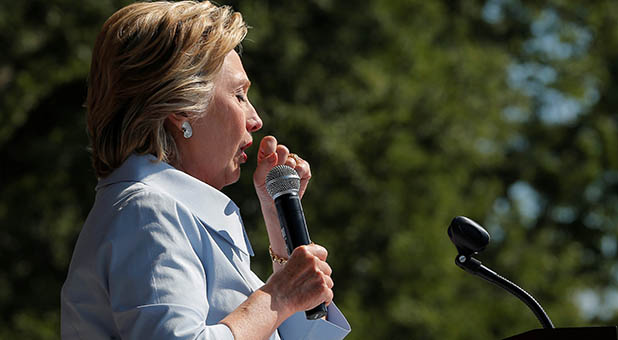What Hillary Clinton’s Health Controversy Says About Us
About three million Americans are diagnosed with pneumonia each year. Only one of them is running for president of the United States.
Hillary Clinton’s pneumonia continues to generate headlines this morning. According to her physician, she was diagnosed last Friday and put on antibiotics. After she collapsed Sunday morning, she was taken to her daughter’s New York City apartment. She exited the building 90 minutes later and told the press she was “feeling great.” A few hours later, her campaign announced that she has pneumonia and is recovering.
Her campaign is now working with her doctor to release “additional medical information,” according to her press secretary. He assured the public that “there is no other undisclosed condition.” However, many are skeptical. As Damon Linker notes in The Week, “Political trust is a fragile thing. Once it’s gone, it’s exceedingly difficult to get back.”
Mrs. Clinton is not the only candidate with trust issues. Donald Trump is facing his own questions regarding his health, his taxes and his much-disputed statements on the war in Iraq. According to a recent poll, 60 percent of Americans believe Hillary Clinton is “not honest and trustworthy,” and 58 percent say the same about Mr. Trump.
You might think that our trust issues begin and end with our presidential candidates, but the facts say otherwise.
According to David Brooks’ latest column in The New York Times, a generation ago, about half of all Americans felt they could trust the people around them. Now less than a third of us think other people are trustworthy. Only 19 percent of millennials believe other people can be trusted. As Brooks notes, “We set out a decade ago to democratize the Middle East, but we’ve ended up Middle Easternizing our democracy.”
The rise of distrust has eroded confidence in our communal bonds: Only 52 percent of adults say they are extremely proud to be Americans, down from 70 percent in 2003. Loneliness and suicide rates are escalating. Brooks is right: “Fear is the great enemy of intimacy. But the loss of intimacy makes society more isolated. Isolation leads to more fear. More fear leads to fear-mongering leaders. And before long you wind up in this death spiral.”
What’s to be done?
You and I may not be able to do much about our society, but we can do something about our personal relationships. To that end, know that biblical forgiveness is choosing to pardon those who hurt us. It is not excusing, forgetting or pretending. It is not allowing them to hurt us again. Rather, it is choosing not to punish them, trusting vengeance to the Lord (Deut. 32:35). In this way, we break the cycle of retribution and replace guilt with grace.
Here’s the bottom line: To restore trust, be trustworthy. To be trustworthy, “Trust in the Lord with all your heart, and lean not on your own understanding; in all your ways acknowledge Him, and He will direct your paths” (Prov. 3:5–6). Guaranteed.











